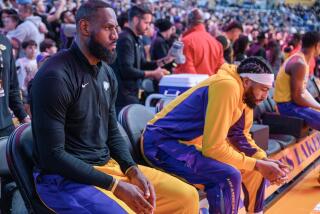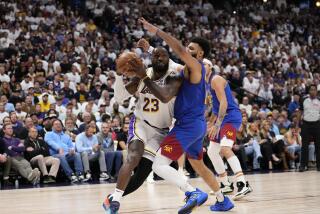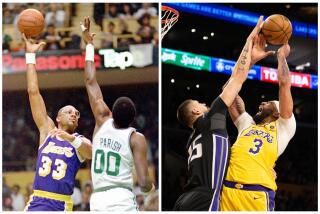THE COMEBACK OF Sam Bowie : No Longer Intimidated, Portland’s 7-1 Center Is Now the Intimidator : By SAM McMANIS, Times Staff Writer
- Share via
PORTLAND, Ore. — Most everyone agreed that Sam Bowie’s most memorable move Thursday night was not one he made on the floor during the Portland Trail Blazers’ temple-throbbing 115-113 victory over the Dallas Mavericks in Game 4 of their first-round playoff series.
No, after sitting on the bench for much of the game because of foul trouble and anxiously standing by as reserve forward Audie Norris sank an 18-foot jump shot with one second left to eliminate the Mavericks, Bowie was only able to cut loose afterward in the locker room.
He sauntered over to where Norris was sitting, entertaining teammates with what vaguely resembled a disco move. Once Bowie had everyone’s attention, he slapped hands with Norris and advised him to immediately renegotiate his contract.
A few minutes later, when the initial euphoria had worn off, Bowie significantly toned down his celebrating. He already seemed to be preparing for the difficult assignment that lies ahead, starting today at 12:30 when Portland plays the Lakers at the Forum in Game 1 of their best-of-seven playoff series.
Bowie, of course, has the unenviable task of playing against Laker center Kareem Abdul-Jabbar in a matchup that many Portland players said could determine their chances to win the series.
“If Sam outplays Kareem, then I think we have an excellent opportunity to beat them,” Trail Blazer forward Kenny Carr said. “If Kareem dominates him, well, we’ll be back home vacationing real soon.”
More than anyone, Bowie knows what is expected of him in this series. But he also knows not to expect too much from himself. After all, Abdul-Jabbar has 14 years and about 33,000 points on Bowie, who says he spent much of his childhood watching Kareem play on television.
“You can’t go out there thinking you can stop Kareem,” said Bowie in a respectful tone bordering on awe. “He’s going to score. He’s going to get his (points). No one has stopped him in 16 years.
“Anytime you play against Kareem and the Lakers, you don’t look forward to it. For someone to say they look forward to playing against them is just false. I’m not going down there (Los Angeles) with the contention that I can go right at Kareem. That could cause nightmares.”
No doubt, images of sky hooks have been running through Bowie’s head now that he knows he’ll be going eye to goggle with Abdul-Jabbar. But you certainly won’t see him quivering like a 7-foot 1-inch slab of Jell-O.
Not anymore.
An accurate gauge of how much Bowie has progressed in his rookie season is his performance against Abdul-Jabbar, whom Bowie considers the best center ever to play in the NBA.
When Bowie first went up against Abdul-Jabbar Nov. 4 at the Forum, it was an entirely forgettable performance. Coming off the bench, Bowie was called for three early fouls, scored just four points and had one rebound in 19 minutes. In short, he was intimidated.
But when the Trail Blazers made their last visit to the Forum April 7, the result was starkly different. Bowie scored 21 points and took down a season-high 20 rebounds in 39 minutes as Portland extended the Lakers to overtime before losing by two points. On that occasion, Bowie was intimidating.
“He’s made great progress,” Portland Coach Jack Ramsay said. “Those games against Kareem have to show you something. That last game against the Lakers came at a time when they already clinched the (Pacific) division and weren’t that inspired. But it still was an important game for Sam.”
Mostly, that game was important for Bowie to prove to himself and others that he is capable of holding his own against the NBA’s best centers. It was important for the rest of the Trail Blazers because they’ll need strong play from Bowie if they want to upset the Lakers.
“I think Sam’s got as good a chance at controlling Kareem as anybody in the league,” Portland forward Kiki Vandeweghe said. “He’s got the talent and the confidence to play with Kareem. There’s no way to stop Kareem. But I think Sam can limit what Kareem can do.”
Asked if he now feels comfortable playing against Abdul-Jabbar now, Bowie looked incredulously at a reporter.
“More comfortable?” Bowie asked. “How can you ever feel comfortable against Kareem? The only thing I’ve learned is not to get frustrated. In the early part of the season, I was making dumb plays and fouls. Or he would score four or five jump-hooks in a row over me.
“The first few times I went against Kareem, I was in awe. He was my idol growing up. But I’m not (in awe) now. I do respect him very much.”
Bowie has earned the respect of others with his play in the last three months after being slowed by ankle and back injuries early in the season. He finished the regular season with a 10.1 scoring average and a 8.6 rebounding average. In his last 40 games, though, Bowie averaged 12.5 points and 9.6 rebounds and shot 54.5% from the field.
He continued his strong play in the first round of the playoffs. Although he shot only 35% and averaged just seven points in the four-game series, he averaged 15 rebounds and four blocked shots a game. Except for Game 4, when he mostly sat because of foul trouble, Bowie was an intimidating factor against the Mavericks.
“He’s going to be good,” said Dallas forward Mark Aguirre, who played with Bowie on the 1980 Olympic team. “I talked to him about it the other night. Michael Jordan is very exciting, but guards don’t win championships. Bowie is going to be there when championship time comes. Players like that bring championships.”
Maybe now, Ramsay won’t have to hear what a poor choice he made when selecting Bowie second overall in last June’s draft. Almost everyone in the league criticized the Trail Blazers for passing up Jordan, who was selected third overall by Chicago, in favor of Bowie.
Somewhat irked by the criticism, Ramsay repeatedly said that a center such as Bowie could eventually bring the Trail Blazers a championship, something he believed that even the dominating Jordan couldn’t do. Whenever people asked Ramsay about it, he would tell people to look at the standings for Chicago’s record.
The only problem with that was that Portland and Bowie did even worse than Chicago early in the season. But now, Ramsay doesn’t have to defend the club’s choice.
“I think Alexander Pope said it: ‘A little knowledge is a dangerous thing,’ ” Ramsay said, smirking. “I’ve never cared much what people said or thought of what I’ve done. In my business, you make decisions and you stick by them. Besides, a lot of people didn’t realize that we already had two players--Clyde (Drexler) and (Jim) Paxson--that already played Jordan’s position (big guard). We needed a center.”
Portland management made an expensive long-term commitment and investment in signing Bowie, and it’s finally paying off.
Bowie, who has a six-year guaranteed contract, will earn $600,000 this season, $400,000 next season and $525,000 in 1986-87. All of Bowie’s salary his first three seasons is money up front. His salary will jump past $1 million the last three years, but $480,000 of it will be deferred each year and collected from 1991 to 1996.
Bowie said that the pressure of a big contract and the talk of Jordan doesn’t bother him. In fact, he expects questions about Jordan in every interview.
“The media thought that about me,” he said. “No one around here (the Trail Blazers) said anything. You get somewhat used to it. I could ask myself the questions the reporters were going to ask before they even asked them. At that particular time, the Blazers were looking for a center, but the way Michael has played this year, he probably could’ve played the center position better than me with the year he had.”
Bowie was only joking, of course. Although intense while playing, he is easy-going off the court and seems to thoroughly enjoy life in the NBA. Exhibit A was his excitement after winning the first-round playoff series.
It is obvious that Bowie is happy just to be playing basketball again. There was a time, not too long ago, when he wasn’t sure that he’d ever play basketball again. Bowie missed two seasons at Kentucky because of a stress fracture in his left shin that refused to heal. As soon as one cast came off, Bowie would try a comeback and wind up back in another cast.
Last year, though, his leg healed and Bowie returned to action. He scored 10.2 points and had 9.2 rebounds a game to help lead Kentucky to the NCAA semifinals. Bowie was never the force some said he would be when he came out of high school, but Portland’s scouts still were impressed.
The only question concerned Bowie’s brittleness. By that time, though, it was no longer a question for Bowie. He had overcome the mental hurdle of worrying about re-injuring his leg.
“I’m glad that three-year ordeal is over,” said Bowie, who won’t let on just how much of an ordeal it was. “You look at the game with a different perspective. You appreciate playing more. It’s more mental than physical. I knew that, one day, my leg was going to heal. But mentally, you still have to overcome a lot more.”
Bowie said it took him only a few months of game action to forget that he might get hurt. Now, he just plays. But whenever Bowie goes crashing to the floor, anyone who knows his history always watches to make sure he gets up.
At 7-1, 235 pounds, Bowie looks fragile even though he is anything but weak on the boards. Even Ramsay admits he had doubts about Bowie’s strength.
“We selected him on potential rather than reality,” Ramsay said. “He did seem a little fragile because of his injuries, but he’s strong. He’ll fool you with his strength. I think the biggest adjustment he’s had to make is playing with his back to the basket. He didn’t have to do that at Kentucky.”
Because the Wildcats also had 7-0 center Melvin Turpin, Bowie started at power forward and often hoisted 12- to 18-foot jump shots. Ramsay advocates a patterned offense in which the center rarely strays from the low post, so Bowie has had to adapt.
Occasionally, though, Bowie will still pull up for an outside shot. But he clearly is more effective underneath for rebounding.
In the Dallas playoff series, Bowie was extremely effective staying in the lane on the defensive end. He had five blocked shots in each of the first two games in Dallas and had nine defensive rebounds in Game 3 Tuesday at Portland. Thursday night, Bowie had only two points and three rebounds in 21 minutes.
The Mavericks, however, don’t have a top-flight center. Rookie Sam Perkins, actually a power forward, has been starting ahead of Kurt Nimphius and Wallace Bryant. Bowie has dominated all three. Out of desperation, Dallas Coach Dick Motta even tried 6-7 Dale Ellis against Bowie Thursday.
“I told Sam before the last (Dallas) game, ‘Don’t let them take you outside the offense or defense,’ Ramsay said. I know Sam likes to go outside and shoot. He’s so aware and competitive that he wants to do it all.”
Bowie is competitive, and he was mildly upset early in the season when Ramsay limited his playing time. Asked about his slow start, the first thing Bowie mentions is lack of playing time.
“I wasn’t in the starting lineup and played only 16 minutes a game,” Bowie said. “Once I started, I got confidence. Things started working out. But it also was a combination of things. It’s a big adjustment from college to the pros.”
Ramsay: “I was trying to find a way to make him comfortable. He has started all the games in the last two-thirds of the season. He will definitely get better. He will block more shots, score more, play better defense. You’ll see Sam Bowie even better next year.”
But from listening to Bowie talk about his matchup with Abdul-Jabbar, he needs to expedite his maturing process.
“It could be a nightmare,” he said with a thin smile.
NBA PLAYOFFS AT A GLANCE
LAKERS VS. PORTLAND
FIRST ROUND (BEST-OF-SEVEN SERIES)
DATE SITE TIME TV Game 1 Today at Los Angeles 12:30 p.m. Ch. 2 Game 2 Tuesday at Los Angeles 7:30 p.m. TBA
More to Read
Go beyond the scoreboard
Get the latest on L.A.'s teams in the daily Sports Report newsletter.
You may occasionally receive promotional content from the Los Angeles Times.










